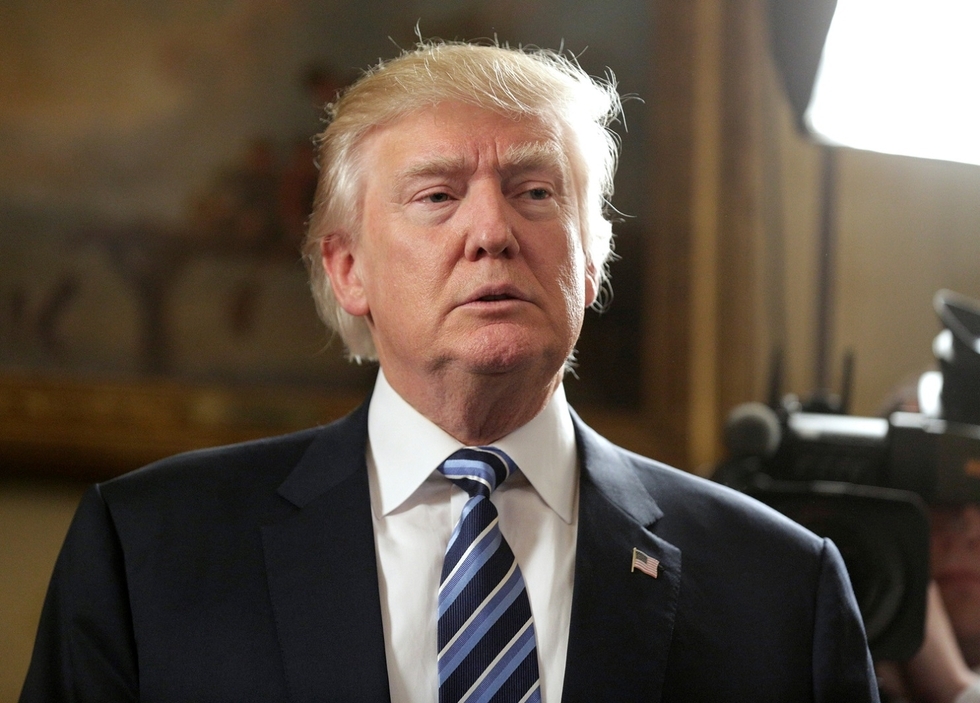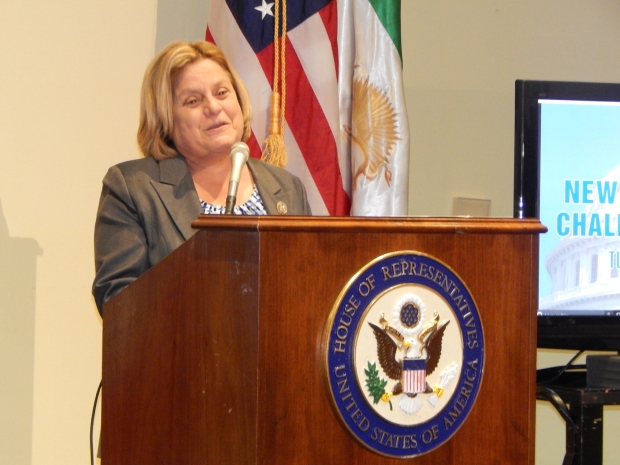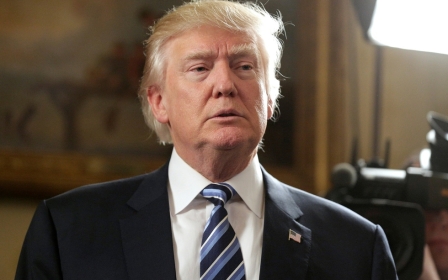Trump’s proposed Muslim ban complicates US-Iranian relations

WASHINGTON, DC - Following through on one of his more controversial promises of the presidential campaign, US President Donald Trump is expected to institute a ban on refugees, immigrants, and visitors from certain countries from entering the United States.
Trump’s intention on banning refugees has forced Iranian-focused advocacy and lobbying groups to redirect their policy priorities from the Iranian nuclear deal, lifting of economic sanctions, and bills targeting Iran that have already been introduced into the weeks-old Congress.
Before the news broke late on Tuesday, the outlook in certain circles was decidedly brighter. On Capitol Hill on Tuesday morning, the Organization of Iranian-American Communities hosted a press conference in which a parade of US lawmakers echoed their support for a free and democratic Iran, which they identified as including support for human rights, defeating the threat of militancy, and removing the nuclear threat.
“The new administration is a great time to revisit policy towards Iran, considering the last administration’s mistakes,” said Ileana Ros-Lehtinen, (R-Fl.) “The last administration was way too lenient, and naively made concessions to an authoritarian regime that has a chokehold on its people.”
Ros-Lehtinen has accepted campaign contributions from pro-Israel donors and, upon leading a Congressional delegation to Israel in 2013 said the “Iranian regime continues to be an existential threat to the democratic Jewish State of Israel.”
Rep. Dana Rohrabacher (R-Calif.) posited enthusiastically: “Isn’t it wonderful to have a president that can use the words ‘radical Islamic terrorist'? Isn’t that a just wonderful thing? That means we have sent a message to those radical Islamic terrorists that run Iran, we know what they are doing and we are not afraid to stand up to their type of tyranny.”
Ted Poe (R-TX) spoke of H.R. 478, the bill he had introduced in the House of Representatives: To require the imposition of sanctions against Iran’s Islamic Revolutionary Guard Corps, and for other purposes.
Those gathered spoke glowingly of the Iranian American people, and passionately for a vision that included a safe and free Iran for its citizens and its diaspora. It was a sentiment not shared by the president, however, as mere hours later, the Huffington Post reported it had obtained a draft of an executive order, which would implement one of his most controversial campaign promises; that of a “Muslim ban”.
“Donald J Trump is calling for a total and complete shutdown of Muslims entering the United States until our country’s representatives can figure out what the hell is going on,” Trump said of himself in 2015.
And while the plan doesn’t call for a complete and total shutdown, it does call for the blocking of Syrian refugees indefinitely and a ban for 30 days for all visitors from countries previously targeted in the restrictions on dual nationals and recent travelers in the controversial visa waiver programme; Iraq, Syria, Iran, Sudan, Libya, Somalia, and Yemen.
For advocacy groups, the announcement put discussions of a revised nuclear plan or lifting of economic sanctions on hold.
'As bad as anything we could have expected'
Jamal Abdi, the executive director of NIAC Action, the lobbying arm of the National Iranian American Council, told Middle East Eye, “The ban is as bad as anything we could have expected based on his campaign rhetoric. Every concern that we had is 100 percent on the table and legitimate.”
On Twitter, New York University professor Ian Bremmer noted that countries chosen for the ban were ones in which Trump doesn’t have existing business ties, and that he omitted countries like Saudi Arabia, Egypt and Turkey.
However, Abdi says that the countries affected by the initial 30-day ban were ones that were already designated by congressional legislation to amend the visa waiver programme. The 30-day ban is ostensibly to lift the burden of US officials attempting to vet every individual. After those 30 days, the administration could require certain countries to submit to additional screening burdens. Subsequently, certain countries could have permanent bans.
“Whether it’s Donald Trump’s potential conflicts of interest or Secretary of State (and former Exxon CEO) Rex Tillerson’s conflicts of interest, that’s when we’ll see which countries are permanently singled out and put on these lists,” Abdi said.
The extent of the ban is still unknown and could affect citizens of the banned countries who are already living in the US on a lawful, permanent residency visa, known as a green card, as well as citizens of those nations who hold dual-citizenship, either with the United States or another, non-blacklisted country.
'We all belong here'
At a news conference on Wednesday afternoon, Council on American-Islamic-Relations (CAIR) Executive Director Nihad Awad said that regardless of the language used in the ban, and whether it’s for limited countries or not, the message was clear: the president was targeting Muslims.
"Ideological and religious questioning imposed on our government agencies by Islamophobes – many of whom are now in policy-making positions - will not make us safer and will instead send a very negative message that Muslims are not welcome in America,” Awad said. "We have already seen an unprecedented spike in anti-Muslim bigotry in recent months. The negative perceptions and association created by these orders will very likely cause a further increase in hate crimes, discrimination and bigotry against ordinary law-abiding American Muslims.”
Other religious groups have spoken out against the proposed ban, including the Jewish Voice for Peace, which issued a pledge on its website to “resist in every way possible. We’ll put our hearts, souls, and bodies on the line to stop these hateful and racist attacks. We all belong here.”
The Congregation of the Sisters of St. Joseph of Peace, an international order of Catholic nuns, which identifies itself as being founded as “a congregation of immigrants, serving immigrants, knowing their pain and suffering,” sent Trump their mission statement for welcoming refugees.
In an impassioned letter, they wrote, “We also urge you to use your position, power, and responsibility as President to end all rhetoric that instills fear, creates division, or incites violence. We also ask that you enact refugee policies which follow international law and expeditiously provide safe haven for refugees and asylum seekers with all rights guaranteed in the U.N. Convention and Protocol on Refugees.”
If Trump’s plan is misguided at best, it’s dangerous at worst, said both Abdi and Awad, who worry that the ban will simply reinforce militant views abroad.
"This ban does not make our country safer. Instead, it serves to stigmatises Muslim refugees and the entire American Muslim community,” Awad said. “It will hand a propaganda tool to our enemies who promote the false narrative of an American war on Islam.”
“I think ISIS is pretty happy today with the message this sends to the world,” Abdi told Middle East Eye, refering to the Islamic State group. “Now the hardliners, the people who say that America is the Great Satan, or that Americans hate them because they’re Muslim or they’re Iranian, they’re all saying I told you so.”
When asked about a way forward for relations between Iran and the United States should the ban pass, Abdi said, “I have a hard time seeing how anyone (in Iran) advocating for engaging with the United States has any kind of political capital now.”
“I think Trump has shut that door,” Abdi said.
New MEE newsletter: Jerusalem Dispatch
Sign up to get the latest insights and analysis on Israel-Palestine, alongside Turkey Unpacked and other MEE newsletters
Middle East Eye delivers independent and unrivalled coverage and analysis of the Middle East, North Africa and beyond. To learn more about republishing this content and the associated fees, please fill out this form. More about MEE can be found here.





